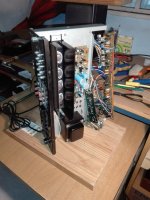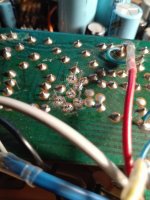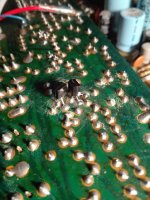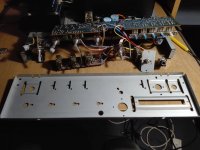Can a failed carbon resistor cause random noises in an audio amplifier ?
https://www.electricalvolt.com/2023/07/carbon-composition-resistor/
In the article it mentions that carbon resistors can cause "random" type noises, but I don't know if this description can be applied to my problem, which by the way is quite puzzling.
I'm trying to bring an old Sansui AU4900 amplifier back to life. It systematically refuses to work without random noises. You can use it for whole days without problems, after a long break, you turn it on again and BOOM! crackles arise that you think are going to explode the speakers sometimes, other times they are weaker, etc. I have made all the TR changes they recommend on this amp. ALL 2SA726 and 2SC1313 from the pre, and IC2SA798 from the power board. The problem persists over time (luckily it is not the only amplifier I use, but it has sentimental value for me and I would not like to consign it to the trash can.
So I think I should look elsewhere for the culprit, ruling out the TR, could it be a out of value/damaged resistor that causes this?
https://www.electricalvolt.com/2023/07/carbon-composition-resistor/
In the article it mentions that carbon resistors can cause "random" type noises, but I don't know if this description can be applied to my problem, which by the way is quite puzzling.
I'm trying to bring an old Sansui AU4900 amplifier back to life. It systematically refuses to work without random noises. You can use it for whole days without problems, after a long break, you turn it on again and BOOM! crackles arise that you think are going to explode the speakers sometimes, other times they are weaker, etc. I have made all the TR changes they recommend on this amp. ALL 2SA726 and 2SC1313 from the pre, and IC2SA798 from the power board. The problem persists over time (luckily it is not the only amplifier I use, but it has sentimental value for me and I would not like to consign it to the trash can.
So I think I should look elsewhere for the culprit, ruling out the TR, could it be a out of value/damaged resistor that causes this?
Did you look for bad solder joints? Is the crackling present with volume turned down? Did you clean the contacts and potmeters? I never experienced crackles from a bad resistor but I won't say it is impossible.
Hugo
Hugo
Hello Hugo
I looked for defective welds, all good. It is not the typical dirty volume potentiometer noise, there are no creaks when actuated. Yes, I consider that it is possible for an R to generate noise continuously, as stated in the article, but this is a different type of noise. In this case it is totally random and sporadic. Ah, one channel has less volume than the other. (the right channel, which is what generates the crackles) This problem already existed before replacing all the mentioned TRs and it persists! But feeding the power board with the pre output of another amplifier, it lasted for a few hours without noise and uniform volume, so I am inclined to believe that the problem lies in the preamplifier. Unfortunately I do not have adequate instruments, only multimeters, the ideal would be to use an audio generator and look at the waveform on an oscilloscope when the crackles appear to detect where the problem is in the circuit...but it is all disassembled and in under these conditions a specialized technician will surely reject the task......
Rolo
I looked for defective welds, all good. It is not the typical dirty volume potentiometer noise, there are no creaks when actuated. Yes, I consider that it is possible for an R to generate noise continuously, as stated in the article, but this is a different type of noise. In this case it is totally random and sporadic. Ah, one channel has less volume than the other. (the right channel, which is what generates the crackles) This problem already existed before replacing all the mentioned TRs and it persists! But feeding the power board with the pre output of another amplifier, it lasted for a few hours without noise and uniform volume, so I am inclined to believe that the problem lies in the preamplifier. Unfortunately I do not have adequate instruments, only multimeters, the ideal would be to use an audio generator and look at the waveform on an oscilloscope when the crackles appear to detect where the problem is in the circuit...but it is all disassembled and in under these conditions a specialized technician will surely reject the task......
Rolo
Attachments
Of course, I have even had metal film resistors that were defective by high noise.
You'll have to locate the problem part by logic and the process of elimination.
Which channel, before or after the volume control, etc.
Try lightly tapping parts with an insulated tool while listening on junk speakers.
Could be a part or a bad solder joint. Don't use your main speakers until this is fixed.
You'll have to locate the problem part by logic and the process of elimination.
Which channel, before or after the volume control, etc.
Try lightly tapping parts with an insulated tool while listening on junk speakers.
Could be a part or a bad solder joint. Don't use your main speakers until this is fixed.
Noise, I understand, but crackle? Just speaking from personal experience 🙂
Anyway, the problem seems to be located in the preamp.
I'd definitely clean all switches and pots as a starter.
Hugo
Anyway, the problem seems to be located in the preamp.
I'd definitely clean all switches and pots as a starter.
Hugo
Also, if you replaced all(?) transistors, don't rule out diodes.
As maudio said, cooling spray could help locate the problem.
Hugo
As maudio said, cooling spray could help locate the problem.
Hugo
Hi Rayma, it's been a while, I hope you're doing well.Of course, I have even had metal film resistors that were defective by high noise.
You'll have to locate the problem part by logic and the process of elimination.
Which channel, before or after the volume control, etc.
So you mean noises from the characteristic I described? Random? This encouraged me to disconnect the preamplifier board completely and do a thorough inspection in a more comfortable way, it was already quite difficult to change all the TRs, to the point that I had to place some of them on the back, because the input switching key made it very difficult to manipulate the new ones and match their EBC pins in the respective holes....
It's hard to describe the noise, I think the most similar thing is when you break French fries....
Grateful, I will continue to report.....
Attachments
Hi maudioCooling spray or gentle use of a heat gun can sometimes also help pinpoint the problem.
Yes, I have tried, but when the noise appears it is very brief and there is no time to do that.
Thank you, I appreciate your opinion.
Last edited:
Hi HugoNoise, I understand, but crackle? Just speaking from personal experience 🙂
Anyway, the problem seems to be located in the preamp.
I'd definitely clean all switches and pots as a starter.
Hugo
Yes, it is an unusual noise, but quite common in this amplifier, the TRs that I already mentioned become noisy over the years
Thank you for your opinion, I will continue to inform
Rolo
Yes, I will have to check preamp diodes too...🙄Also, if you replaced all(?) transistors, don't rule out diodes.
So you mean noises from the characteristic I described? Random?
Yes, this can and does happen, but the source can be tricky to find.
Localize it as much as you can, and then take drastic action.
Odds :
1) I locate the source, be it a resistor or a diode, I replace it and it is solved.
2) I can't locate the problem and I have no more desire to waste time, so it will go to the attic or the trash can.
Am I understanding you?
1) I locate the source, be it a resistor or a diode, I replace it and it is solved.
2) I can't locate the problem and I have no more desire to waste time, so it will go to the attic or the trash can.
Am I understanding you?
That's pretty much it, except for:
3) sell on ebay as "for parts or not working"
When I bought parts that came from a bad production run of Dale RN metal film resistors,
they took a while to start being noisy. I was lucky enough to find the noisy culprit on the first try.
Then I just replaced all of that particular part.
3) sell on ebay as "for parts or not working"
When I bought parts that came from a bad production run of Dale RN metal film resistors,
they took a while to start being noisy. I was lucky enough to find the noisy culprit on the first try.
Then I just replaced all of that particular part.
It's what I feared, but, lost for lost (I'm not in any hurry and it's a hobby for me), I'll do the following:
I will reconnect the power board to the NAD pre output, and leave it running all day to make sure that section is OK. Having that ruled out, I will disconnect all the cables and free the pre board to check each component individually, without power, that will be fun! I hope to find some altered R, if not I will change the diodes, because they will be difficult to test in static conditions...I will tell you as soon as I have results, wish me luck as it happened to you! ...
I will reconnect the power board to the NAD pre output, and leave it running all day to make sure that section is OK. Having that ruled out, I will disconnect all the cables and free the pre board to check each component individually, without power, that will be fun! I hope to find some altered R, if not I will change the diodes, because they will be difficult to test in static conditions...I will tell you as soon as I have results, wish me luck as it happened to you! ...
Attachments
It's unlikely any unpowered measurements will show a correlation to the noise.
Best approach is in post #4.
Best approach is in post #4.
Then it won't be a bad idea to go over all the soldering on the preamplifier board, even doing so before disconnecting it......what can I lose ? 🙄
Looks like a wave soldered board, so resoldering the joints would be reasonable to do.
Some of the connections could be marginal. It's best to use 63/37 solder.
Some of the connections could be marginal. It's best to use 63/37 solder.
The idea is to resolder the existing welds one by one, that would have to eliminate a defective weld, I am not going to replace all the welds with new ones, unless I notice some where it is necessary. I use 60/40, the most common. I understand that a little less tin and a little more lead can be beneficial, for greater elasticity in the joint. This will be a work of patience and time, there are other tasks to do. Thanks rayma, I'll report back.
I have no quarrel with any of the suggestions offered.
If you remain stuck, I suggest trying to localize the problem. I surmise it's one channel only? And within the preamp section--- i.e. no noise with volume at 0? Try a "divide and conquer" search to localize: at about halfway in signal path, disable bias on a preamp stage or disconnect a DC blocking cap and ground the source side of the cap. Continuation vs. absence of the noise will tell you in which direction to search--- that is, restore the opened path and introduce a new experimental block ~ halfway in the appropriate direction.
Good luck!
If you remain stuck, I suggest trying to localize the problem. I surmise it's one channel only? And within the preamp section--- i.e. no noise with volume at 0? Try a "divide and conquer" search to localize: at about halfway in signal path, disable bias on a preamp stage or disconnect a DC blocking cap and ground the source side of the cap. Continuation vs. absence of the noise will tell you in which direction to search--- that is, restore the opened path and introduce a new experimental block ~ halfway in the appropriate direction.
Good luck!
- Home
- Amplifiers
- Solid State
- Resistance with random crackles in Sansui AU4900, is it possible?



